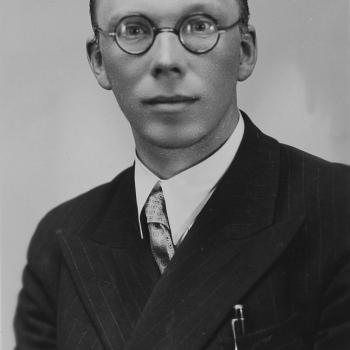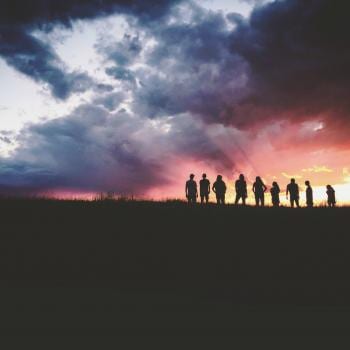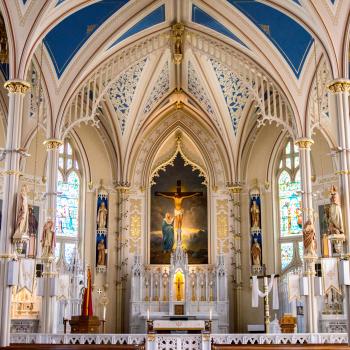Today’s Guest Post is by Sr. Julia Walsh, FSPA.
It’s a gray day, one of those types where the clouds hang heavy and seem to block out all sunlight. Inside a cozy lamp-lit room, I am sitting in a circle of ministers training to be spiritual directors and practicing the art of listening. Around the circle, person after person tells a story from their life that is personal.
With each telling, I notice layers of transformation and transition; I hear about the wonder of discovery and the lightness of hope. A phrase comes to mind: the goodness of gray. I jot the words into my notebook and open my heart wide. Although this happened weeks before Advent, “the goodness of gray” remained a constant suggestion, a companion in the season of searching, longing and waiting.
We are people who long for simplicity, who often ache for clearly defined borders and lines. Even though we may know that complexity and conversion is healthy and natural, we are comfortable with what’s predictable, what we know, what feels safe.
There may have been times when answers were easy, when we knew what to expect. For some it was the patterns of childhood, the days of easy answers and comfort zones. For others, we found solace in the rituals of our religion or what was considered proper and polite. Our memories might be hazy, but nostalgia convinces that there was a time when much stood strong on solid ground. Elected leaders compromised. Polarities were unusual. Religious life was defined. Democracy was functional. Unity and peace were valued and Churches were places of refuge and calm.
Now, we don’t know about much. Nearly everything we are familiar with — from the structures of Church and society, to technology and the ecosystems sustaining us — seems to be in transition, in flux. What we forget, though, is that this is nothing new. Humans have been experimenting with structures and designs since our species began. Tradition has always been a series of gradual evolutions. Even the ground beneath us was once an ocean floor.

Clock Time and God’s Time
I’m writing this during the 3rd week of Advent and expect you to read it during the Octave of Christmas. I am writing this near the glow of a simple Christmas tree and with the scent of freshly baked cookies wafting in the air. By the time you read these words, the cookies cooling on the counter could be consumed and forgotten. The linear nature of my calendar promises that I’ll be ending a retreat or preparing for Christmas company when this is published on screens. Yet, my body tenses when I think of what sort of tragedies and heartaches could occur between now and then, what sort of events this writing could fail to acknowledge, what sort of gray I may evade.
As children of God commissioned to build a reign of peace and justice, we often forget that we are people of kairos time. We are instruments in God’s mysterious time, not linear but layered. Yes, chronos time establishes the elements of our minutes and contributes to the designs of our to-do lists and schedules. Chronos time is felt in the shifting of light and ticking of seconds, minutes, hours, days. But as children of God, we are people of now and not yet, of anticipation tangled with arrival — we are in God’s time, kairos. We are designed to trust in the power of providence. We are invited to awaken to the sacredness of moments and the opportunities offered to us to respond, love, serve: to discern the signs of the times.
In this energy of kairos time, we are people of waiting and longing for the fullness of God’s goodness, for the decline of injustice and the arrival of peace, while being people who know God is intimately near. Emmanuel: God with us. Now, here. In your breath. In my heartbeat. Yesterday, today, tomorrow: the energy of Emmanuel is the in the ordinary and the momentous, in the sorrow and the joy of salvation. It’s the paradox of pain and beauty together, the death with the birth.

Feast of the Holy Innocents
The awesomeness of the Incarnation is layered upon the slaughter of children. (And somehow, strangely, our tradition ponders the injustice by naming the kairos moment the Feast of the Holy Innocents (observed each year by the western church on December 28). A feast, for the horror of massacred children. For with every light there is darkness and, in every truth, there is gray.
The gray, though, can be disorienting, troubling. It’s tough to trust and have hope. We may become lost or slowed as we try to navigate through what’s unknown, liminal, becoming. I imagine that for the parents of the children killed in Bethlehem, it was tough to believe that Messiah had arrived.
This kairos time is the energy of epiphany: diverse wisdom travels the journey of mystery toward True Light. When the wise ones encounter truth and mystery, they make offerings of humility. They worship and adore. They model how to love and submit to the mystery. In their gesture, they show us how to honor the moment and lead in the way that Sister Pat Farrell suggests:
“This is our moment. The world around us teeters on the edge of both peril and promise. Breakdown and breakthrough tussle with each other. The path forward is hidden in fog. It is your time to lead. To do so, you must learn to be led and to listen deeply.”
In the circle of people training to be spiritual directors, I heard stories of struggle, transformation and transition. Each story contained elements of moving through the mystery, of coming to a place of clarity and renewal. Yet, that time in the gray spaces that they had journeyed through, the unknown offered chances for goodness and grace. A demeanor of trust and openness allowed the gray times to be good, the Kairos moment to be known, for God’s closeness to be felt.
In the goodness of the gray, we are all moving toward greater freedom. In the goodness of the gray, during these days of Feast and tension, may we all become freer indeed.

Today’s Guest Post is by Sr. Julia Walsh, FSPA. Sr. Julia is a Franciscan Sister of Perpetual Adoration who ministers as a retreat director, educator and spiritual writer. Her writing has appeared in Global Sisters Report, Living Faith and elsewhere. She is currently working on her first book, a memoir about joining the Franciscans and the brokenness of the Catholic Church. Sister Julia enjoys camping, cooking, traveling, watching movies and spending time with her Franciscan community, family and friends. She lives in Chicago. You can explore her writing further at www.messyjsesusbusiness.com or follow her on Twitter (like I do) at www.twitter.com/juliafspa.
Enjoy reading this blog?
Click here to become a patron.














